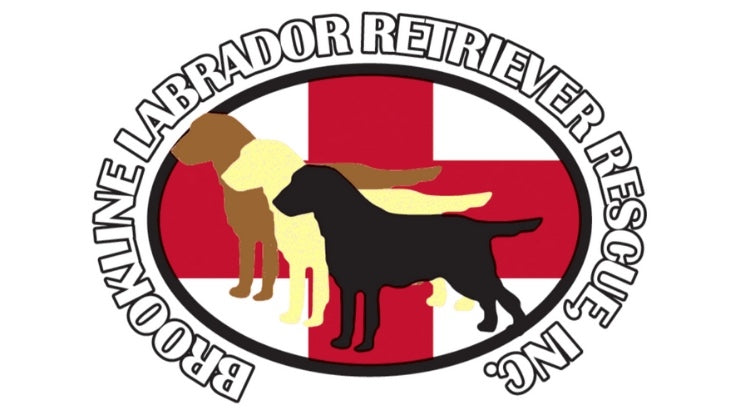Rescue Of The Month
Brookline Labrador Retriever Rescue - Rescue of the Month, October 2018
Our Rescue of the Month for October is Brookline Labrador Retriever Rescue, which is an exclusively volunteer-operated rescue with a network of volunteer foster homes throughout Pennsylvania, New Jersey, and Delaware. We're so excited to be working with this amazing organization this entire month. We sat down with one of their volunteers who shared how Brookline was started, their challenges, and ways to help.
Tell us about how Brookline was started? Is there a personal story behind Brookline's mission?
Brookline Labrador Retrieve Rescue was founded in 1997 by Nicole Soyster and her husband, Mike, and is named after their family Labrador Retriever, Brooke. While many rescue organization thrive as a referral source for families looking for a dog and for those considering surrendering a family pet, Brookline has operated under a slightly different model since its inception. Nicole’s belief was that Brookline could succeed by placing dogs in its care into a network of foster homes, a setting that allows each dog to live as a family pet and one that gives the volunteer a chance to fully evaluate the dog’s temperament and behavior. Because we get to know each dog as an individual, Brookline volunteers can better match dogs to a forever home. Today, we continue this legacy, and we are proud to say that we do not just place dogs in homes … we help families welcome an additional member of their pack.
Is there a reason why Brookline is focused on labs? Do you rescue other dogs in certain situations?
Brookline is exclusively dedicated to helping families adopt Labrador Retrievers and Lab mixes. In part, Brookline is dedicated to helping place Labrador Retrievers and Lab mixes because of our founder’s fondness for the breed. But we also recognize that there is a need to help advocate for and educate about Labs: Although they can be the perfect family dog, Labs require special dedication and attention. By focusing on the needs of one breed, we have developed a specialty that allows us to be passionate and informed voices for the dogs in our care.
What are the biggest challenges Brookline faces?
Brookline is a 100% volunteer organization, which is both our greatest asset and the biggest obstacle we face. On the one hand, every dollar we raise is funneled directly to the care of our dogs. And because we are an entirely volunteer organization, there is a certain camaraderie amongst our members, because everyone feels invested and that they are part of both our successes and failures. Yet, because we lack the organizational infrastructure associated with dedicated staff members, it is often a struggle to manage resources and set aside time to attracting new volunteers—and finding foster homes is probably the single hardest challenge we face. Of course, being a non-profit organization, lack of funding for vet bills is a challenge, as well.
Running a rescue and helping dogs can be tough, both emotionally and physically. Can you share a tough experience or trying moment for Brookline, and what you did to overcome it?
In a perfect world, Brookline would be able to save every Labrador Retriever in our coverage area and help every family looking for a dog welcome home a new member of their pack. But rescue work is not a fairy tale. Often, for the sake of the dog or in the best interest of a prospective family, we have to use our best judgment and refuse a match. We know how devastating it can be to hear ‘no’ but we also know that finding a forever match takes time, dedication and patience.
Unfortunately, there are also times where our efforts are simply not enough to save a dog or help a family. Sadly, not every dog can be saved, and for some of our older dogs or those with serious medical conditions, sometimes the best we can do is to give a dog dignity in the final stages of its life. In a way, serving in this capacity is a win for our organization, because part of our mandate is to be a voice for the voiceless, but the people involved, especially if they need to make tough decisions, still get hurt.
Rescue work is hard work, and there is a lot that goes on behind the scenes that can be draining and tiring—from a leadership perspective, that includes organizing and fundraising, but the real heavy lifting is done by our volunteers, who spend countless hours caring for dogs, working with families, attending vet visits, helping out at events and making sure our organization runs smoothly. Our volunteers really go above and beyond, including generously reaching into their own pocket to help cover expenses. Overall, we succeed more often than we “fail” (for lack of a better word), but that does not diminish the pain associated with not accomplishing everything we want. And yet, those tough times are also when our volunteers seem to naturally come together to support one another.
Do all dogs stay with fosters in the area or do you also have a facility where some dogs stay?
Brookline operates as a network of volunteer foster homes throughout Pennsylvania, New Jersey, and Delaware. Our foster families take on a lot of responsibility and they are the sole reason we are successful. Organizations that house animals in a central facility can be successful, and they often are, but our model is really predicated on giving dogs a chance to live in a foster home, which allows their personality to blossom outside of captivity and lets our volunteers learn what will be the best forever home for that dog. Less frequently, a dog being surrendered will continue to live with its family until we find a suitable new home. In either case, it is the personal touch we offer that makes us unique and different.
Where does your primary financial support come from?
We do not have a primary source of financial support. Brookline relies on donations—throughout the year and during our annual appeal—and sponsors events, such as our online auctions in the Spring and Fall and our Lagers for Labs in May, to help raise money. We also attend numerous events throughout the year where we sell merchandise to raise money to help our labs.
How many dogs on average do you place in their forever homes annually?
Brookline places approximately 100 Labs and Lab mixes per year.
For those reading this, if they want to help fight the good fight, what can they do to help?
Volunteer! Foster! Donate!
What are the plans for the future of Brookline?
We are always looking to increase the number of Labs and Lab mixes that we can help. Eventually, we may have our own kennel facility, but in the meantime, the more foster homes we have, the more labs we can help. We have attracted a wide array of very dedicated volunteers, and each individual brings something unique and special to our organization. But we could always use more help advocating for, educating about and saving Labrador Retrievers and Lab mixes!
If you want to learn more about Brookline Labrador Retriever Rescue, like them on Facebook, check out their available dogs, and donate today.
Rocket Dog Rescue - Rescue of the Month, September 2018
Pali Boucher started Rocket Dog Rescue in 2001 with the mission of helping create a world where all companion animals having loving and permanent homes and where no good natured dogs, no matter what their age, are killed because they are considered to be surplus or un-adoptable. Boucher's story is truly inspirational, and we are so honored to name Rocket Dog Rescue as our Rescue of the Month for September.

Before starting Rocket Dog Rescue, Pali was homeless living on the streets of San Francisco. Growing up, her mother struggled with drugs, mental illness and was homeless. Pali's mother had passed away when she was 10. For a short time after, she was in foster care, then with her dad, and then back on the streets.
While homeless, she would visit the dogs at the San Francisco SPCA, which at the time was a kill shelter. She would say hi to the dogs and give them some attention. "I wasn’t looking to adopt. But there was this one hound dog always baying at the top of his lungs. I fell in love. So somehow, I got the money, faked an address and adopted him," Pali recalls. His name was Leadbelly.
Taking care of a dog while homeless can come with significant challenges, and Pali unfortunately faced many of them. She was in and out of jail and was very close to losing Leadbelly a couple times. This was when she realized she needed to make a change in her life and decided to enter a drug program. Pali found a friend who would care for Leadbelly during her recovery. About a year later, she was clean and sober and had Leadbelly back in her life. It was at this time that Pali's subsidized housing was approved, and she was so grateful to have a roof over her and Leadbelly's heads.
Pali spent the following years fostering many dogs. Sadly, Leadbelly died in 2001, but with his passing came an idea. "I wanted to go the next step and create my own nonprofit. My core group of about 10 friends became my board of directors and volunteers. Rocket Dog Rescue is a tribute to Leadbelly. He helped me learn how to take care of myself by taking care of him," said Pali.
For more than a decade, RDR operated without a facility and was solely dependent on their network of fosters around the Bay Area. After much hard work, dedication, and fundraising, Rocket Dog Rescue was able to open their own Urban Sanctuary and Adoption Center in Oakland, California in 2014.

RDR has saved over 10,000 dogs from euthanasia in overcrowded Bay Area shelters and is exclusively volunteer run and operated. We'll be donating $1 or more for every product purchased from Neptune & Co. to Rocket Dog Rescue for the entire month of September. You can donate directly by clicking here, and can follow RDR on Facebook and Instagram. If you're looking to adopt a dog, check out their available dogs here.
The Vanderpump Dog Foundation - Rescue of the Month, June 2018
British restaurateur, author, actress, and television personality Lisa Vanderpump has added "animal rights activist" to her long list of accomplishments. In 2015, after witnessing the horrific images of slaughter and abuse of dogs in preparation for the Yulin Dog Meat Festival, which in an annual event in Yulin, China, Lisa was determined to do something about this. Executive Director, Dr. John Sessa, recalls,
"[Lisa] immediately started emailing me and calling her husband Ken to see what we could do about it. We immediately made a PSA with Sharon Osborne, executed a large demonstration in front of the Chinese Consulate and made several trips to Washington DC to lobby for House Resolution 401, which we helped author."
It was around this same time that Lisa, Ken, and John realized the huge dog homeless and overpopulation problem occurring in their own backyard in Southern California. In Los Angeles alone, over 3,000 dogs are euthanized in city and county shelters each year. The three knew they had to help, so they started The Vanderpump Dog Foundation in 2016 and opened the Vanderpump Dogs Los Angeles Rescue Center just over a year ago. The Rescue Center is swanky and brings the "Vanderpump" flare and style complete with jazz music, velvet couches, and even chandeliers.
Check out our Q&A with Dr. Sessa below:
What are the biggest challenges Vanderpump Dogs faces?
 Dr. Sessa: We have been able to become a huge voice for the voiceless in a very short amount of time and I think our biggest challenge is keeping up with the demand for help. We get hundreds of calls and emails every day about dogs domestically and around the world that need our assistance. It is our duty to make sure we are a source for information and resources for everyone reaching out to us and help as many as we can.
Dr. Sessa: We have been able to become a huge voice for the voiceless in a very short amount of time and I think our biggest challenge is keeping up with the demand for help. We get hundreds of calls and emails every day about dogs domestically and around the world that need our assistance. It is our duty to make sure we are a source for information and resources for everyone reaching out to us and help as many as we can.
Running a rescue and helping dogs can be tough both emotionally and physically. Can you share a tough experience or trying moment for the organization, and what you did to overcome it?
Dr. Sessa: We have a very dedicated and compassionate team, who strive to help every dog who needs our assistance. I think the biggest struggle and experience we have to continually get over is the inability to help every dog that comes our way. I just always remind the staff that we can help as many dogs as possible today and with our larger legislation and education efforts, we will eventually be able to effect change on a long term and be able to help all dogs. Dealing with loss is always difficult, but a part of the job when rescuing.
Do all of the dogs you rescue stay in the Rescue Center or do you have a network of fosters in the LA area that help care for the dogs as well?
Dr. Sessa: We do a combination of both fosters and in-house dogs. Our volunteers and fosters have become such an important part of running the non-profit and making sure to keep expenses at a minimum.
Where does your primary financial support come from?
Dr. Sessa: Originally our financial support was solely from Ken and Lisa, which can get tasking and expensive. Thankfully, the model that we have built has a revenue producing entity with our grooming, retail and adoptions. This contributes to about half of our total overhead, our annual fundraisers (World Dog Day and our Gala) produce a significant portion and our wonderful donors contribute the rest.
How many dogs on average do you place in their forever homes annually?
Dr. Sessa: The first year of operations, we successfully rescued and rehomed 500 dogs. Our goal is to double that this year!
For those reading this, if they want to help fight the good fight, what can they do to help?
Dr. Sessa: I suggest they go to www.vanderpumpdogs.org and help our efforts by building your own fundraising team or join one of our existing teams. We have competitions for groups to win prizes, as well as, raise money for our dogs - so it is a win win! Also - there are several other ways to show your support and they are listed on the website.
What are the plans for the future of Vanderpump Dogs?
Additionally, we are continuing our rescue efforts locally (hoping to double our adoption numbers from last year) and internationally, bringing much needed supplies for dogs to third world and impoverished countries.
In the long term, we would like to eventually open a sanctuary and rescue operation in Malibu on a significant parcel of land.
If you want to help this amazing organization, you can donate here, check out their adoptable dogs, and follow them on Instagram and Twitter.




